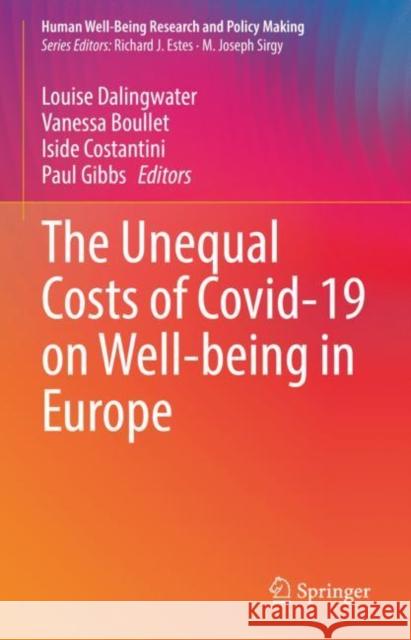The Unequal Costs of Covid-19 on Well-being in Europe » książka
The Unequal Costs of Covid-19 on Well-being in Europe
ISBN-13: 9783031144240 / Angielski / Twarda / 2022 / 206 str.
The Unequal Costs of Covid-19 on Well-being in Europe
ISBN-13: 9783031144240 / Angielski / Twarda / 2022 / 206 str.
(netto: 325,85 VAT: 5%)
Najniższa cena z 30 dni: 327,68
ok. 22 dni roboczych.
Darmowa dostawa!
This volume focuses on the wider wellbeing costs within European countries as a result of the outbreak of the pandemic and the control measures implemented thereafter. In particular, it considers to what extent Covid-19 and measures taken to cope with the crisis have weakened economic and social structures across Europe and what effect this has had on people’s lives. While many countries in Europe have reallocated public funding to health care, provided support to SMEs, vulnerable populations and regions hit by the crisis, the wellbeing or welfare costs, considered broadly, are still significant. The authors' assessment thus goes beyond the subjective wellbeing discourse and evaluates to what extent structural weaknesses within economic, social and regional frameworks have deepened. The chapters discuss what policies are needed to address these weaknesses. the volume thus recognises that structural inequalities are a key driver of wellbeing. While there have been a number of publications on wellbeing during the pandemic, the original perspective in each chapter on inequalities and the European focus of this publication provide novel information and insights on the topic.
This volume focuses on the wider wellbeing costs within European countries as a result of the outbreak of the pandemic and the control measures implemented thereafter. In particular, it considers to what extent Covid-19 and measures taken to cope with the crisis have weakened economic and social structures across Europe and what effect this has had on people’s lives. While many countries in Europe have reallocated public funding to health care, provided support to SMEs, vulnerable populations and regions hit by the crisis, the wellbeing or welfare costs, considered broadly, are still significant. The authors' assessment thus goes beyond the subjective wellbeing discourse and evaluates to what extent structural weaknesses within economic, social and regional frameworks have deepened. The chapters discuss what policies are needed to address these weaknesses. the volume thus recognises that structural inequalities are a key driver of wellbeing. While there have been a number of publications on wellbeing during the pandemic, the original perspective in each chapter on inequalities and the European focus of this publication provide novel information and insights on the topic.











